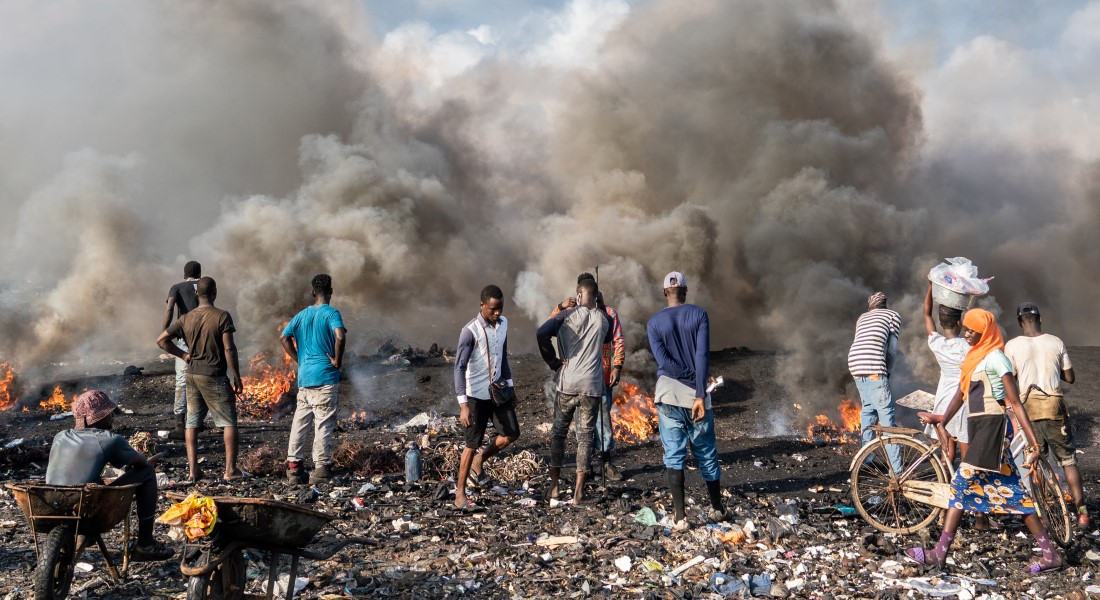New project maps illegal mining and global environmental crime
With a DKK 12 million grant from the Independent Research Fund Denmark, researchers from the University of Copenhagen will study how minerals are irregularly mined in Ghana and end up in technological products, only to return and dumped as e-waste.

Environmental crime is one of the most profitable and fastest growing forms of international organised crime. Nevertheless, we only know a little about the local and global forces and structures that support it.
With irregular mining in Ghana as a focal point, researchers from the University of Copenhagen will now look into who is benefiting from exploiting ecosystems, and how irregular mining is undermining the environment and challenging the green transition.
Thanks to a DKK 11.9 million grant from the Independent Research Fund Denmark, the project 'Environmental Crime and Illegal Ecologies (ILLECO)’, headed by Professor Henrik Vigh from Department of Anthropology and running from 2022-2026, will investigate irregular mining in Ghana.
The country is home to one of the world's largest irregular mining industries and the project will follow the full lifecycle of minerals from their mining to transnational smuggling and use in products such as batteries and microchips and eventual dumping back in Ghana as electronic waste.
According to Henrik Vigh, this type of international environmental crime is an overlooked area, even though it is a concern for green transition and sustainability.
“Due to growing green-tech demand, minerals such as gold, silver, manganese, bauxite and lithium are increasingly and irregularly mined with grave environmental effect, which in itself is paradoxical. But we need more insight into how such minerals in fact are irregularly mined, smuggled, traded and dumped, and how this challenges green transition initiatives. Looking into Ghana as case study, we will be able to map the whole circuit including and analysing its industrial organisation and political-legal framework,” he says.
The study will look into irregular mining from several angles combining anthropology, ethnography, economics and law with contribution from a group of researchers:
- Three sub-projects examine – adopting ethnographic field studies in Ghana – irregular mining operations, the trade of the minerals internationally and their subsequent dumping as electronic waste in Ghana. Assistant Professor Humphrey A. Asamoah from Department of Political Science and Henrik Vigh are conducting different parts of this mapping.
- A fourth and fifth subproject focuses on the underlying economic organisation of the trade and a number of political and legal aspects in the area. Associate Professor Pablo Selaya from Department of Economics and Professor with special responsibilities Thomas Gammeltoft-Hansen from the Faculty of Law are responsible for the individual sub-projects.
Furthermore, George M. Bob-Milliar from Kwame Nkrumah University of Science and Technology in Ghana is affiliated with the project, which also involves researchers from the universities in Oslo and Melbourne and Harvard in advisory roles.
Strengthening legislation and regulation
Henrik Vigh expects that the project will shed new light on global environmental crime in the coming years and ultimately help to ensure the implementation of more efficient regulation locally and internationally.
By examining the relationship between the global and the local, we will be able to indicate where the existing legislation needs to be strengthened and where new regulations need to be added.”
He points out that environmental crime is often a grey area of legal and illegal activity.
"To solve the problems surrounding this type of crime, we need to examine how the law is circumvented and reinterpreted, where and when authorities turn a blind eye and what gaps there are in international law. By examining the relationship between the global and the local, we will be able to indicate where the existing legislation needs to be strengthened and where new regulations need to be added,” says Henrik Vigh.
He also emphasises that the project will reach out to the key players in the field along the way.
The project will collaborate with stakeholders within the mining industry in both Ghana and at international level, as well as international bodies like UNODC, the United Nations Office on Drugs and Crime.
Contact
Professor Henrik Erdman Vigh (PI)
Institut for Antropologi
Email: hv@anthro.ku.dk
Telephone: +45 35 32 34 91
